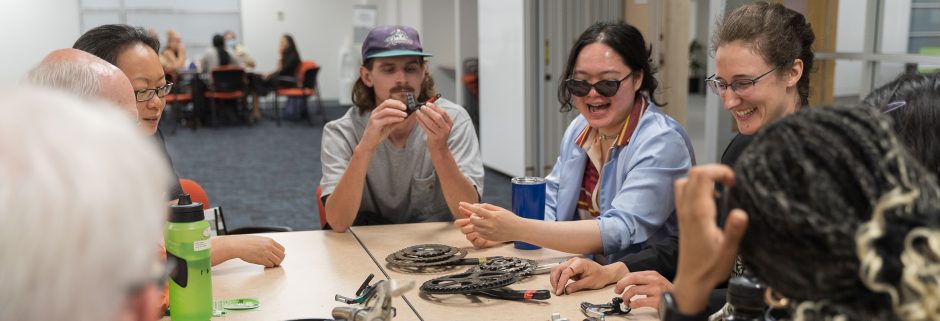
Program Overview
UBC Connects at Robson Square is a two-year pilot program aiming to provide more equitable access to knowledge created by the university and burst notions of the “Point Grey bubble” through the activation of UBC’s downtown campus.
To meet its goals of bringing innovative, engaging, public programming to UBC Robson Square, the program provides free space and support to engaged faculty members and their community partners.
The program is currently in year 2 of its pilot period, funded by UBC’s Academic Excellence Fund and housed in UBC Community Engagement with support from UBC Robson Square.
Connects in the News
In addition to outreach to community organizations, we have also leveraged internal media outlets to bring awareness to the Connects at Robson Square program, including articles from:
- Folil Trafün: Connecting Afro-descendant, Indigenous and Latin American Communities in the Lower Mainland Through Film
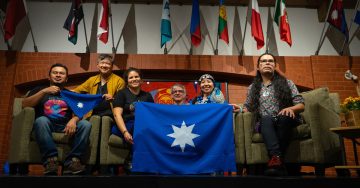
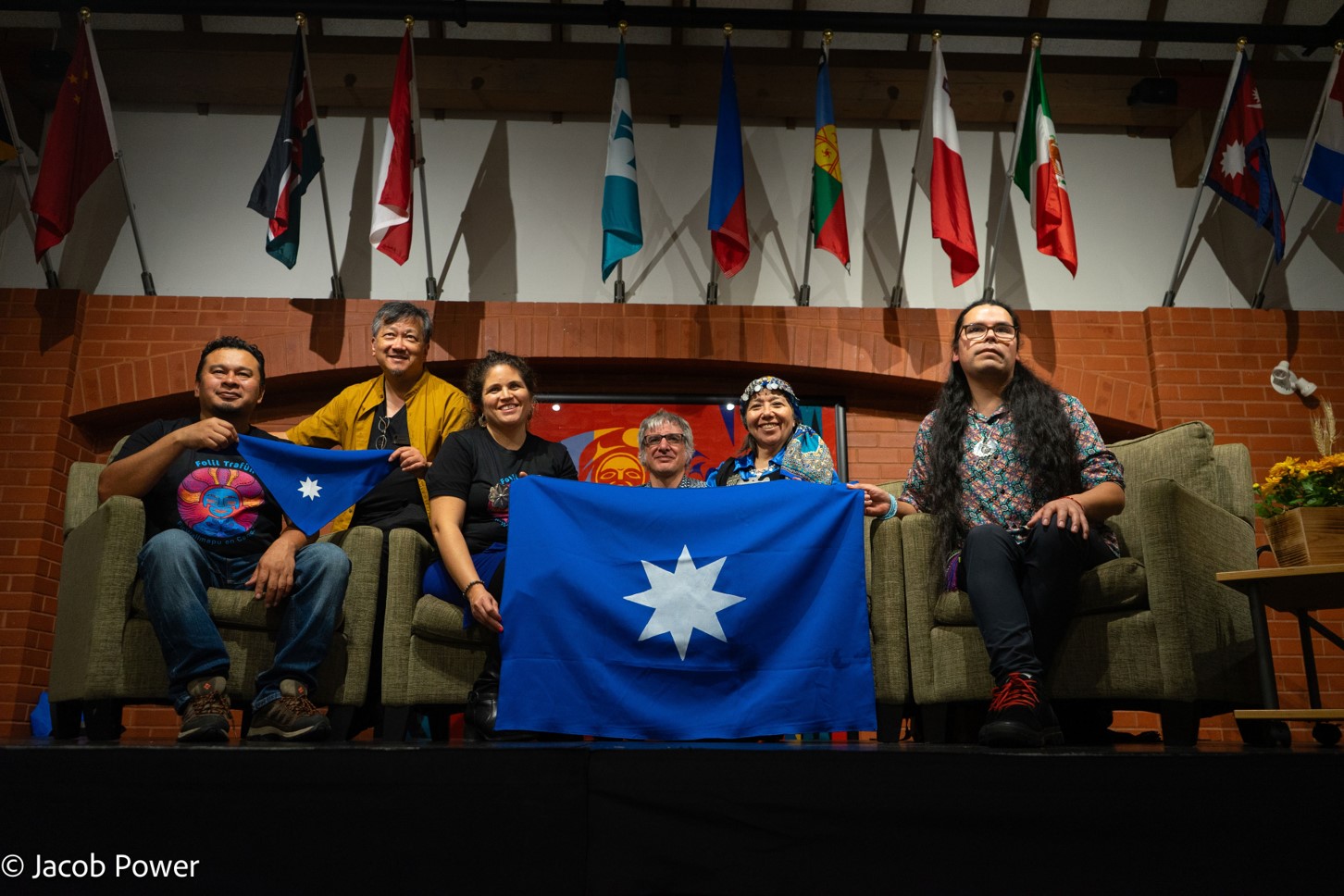
Community members on the second to last day of the Folil Trafün: Joining Roots Film Festival. Photo Credit: Jacob Power. In the fall of 2023, the Vancouver Latin American Cultural Centre (VLACC), Ficwallmapu, and UBC’s Faculty of Forestry collaborated to highlight and celebrate Indigenous and Afro-diaspora films from Latin America, followed by dialogues to deepen understanding of the films and their relationship with local realities.
During the four days of the Folil Trafün festival, audiences had the opportunity to delve into several Indigenous and Afro-diaspora films from Latin America. At the main showcase of the festival, hosted at UBC Robson Square, attendees immersed themselves in feature-length, documentary, and short films including Folil (Feature film – 2020), Energía de los Pueblos (Documentary – 2020), Kapaemahu (Short – 2020), Tita, tejedoras de raíces (Short – 2018), Mama para (Short – 2020), Muu Palaa (Short – 2020), Trully (Short – 2016). Through these films, audience members gained exposure to stories, experiences, and knowledge historically underrepresented in academia.
In addition to film screenings, VLACC, Ficwallmapu, and UBC Forestry collaborated to organize panel discussions and Q&A sessions, providing a platform for audiences to listen to and learn from Afro-descendent, Indigenous, and Latinx voices, including Indigenous scholar and filmmaker Jeannette Paillan and Williche Indigenous visual artist and graphic designer Antü Pradines Antillanca. UBC professor of Cinema and Media Studies Dr. Alessandra Santos and UBC co-lead Dr. Hisham Zerrifi also spoke at the event.
When asked about the experience and impact of the project, VLACC Executive Director Lili Vieira de Carvalho expressed that, “The first edition of Folil Trafün was a fantastic opportunity to start a conversation about the Indigenous Experiences in the Americas, including the stories of colonization in Latin America and Canada. This fantastically curated event sparked curiosity, exposed diverse realities, and opened spaces for difficult but necessary conversations.” She went on to say, “At VLACC, we are proud to have contributed to the amplification of Indigenous voices through art. Co-presenting Folil Trafün aligns with VLACC’s commitment to promoting inclusivity, cultural awareness and pride and finding how we can contribute to a path to Reconciliation.”
“We are proud to have contributed to the amplification of Indigenous voices through art. Co-presenting Folil Trafün aligns with VLACC’s commitment to promoting inclusivity, cultural awareness and pride and finding how we can contribute to a path to Reconciliation.”
— Lili Vieira de Carvalho, Executive Director, Vancouver Latin American Cultural CentreThrough the festival’s activities, the project successfully transmitted ancestral knowledge, creating a forum to critically examine the roles of knowledge holders, and promote truth, reconciliation, and decolonization within academia and society at large.
See below for project details and a Q&A with project co-lead Dr. Hisham Zerriffi.
Project Details
Project Title: Folil Trafün: Connecting Through Indigenous Films from Latin America and Canada
Project co-leads:
- Thais Bouez, Programming Coordinator, The Vancouver Latin American Cultural Centre
- Dr. Hisham Zerriffi, Associate Professor and Associate Dean, Equity, Diversity and Inclusion, Department of Forest Resources Management, Faculty of Forestry
Project duration: September 2023 to October 2023
Learn more: https://forestry.ubc.ca/events/folil-trafun-joining-roots-festival/
This project was supported by UBC Connects at Robson Square and the Partnership Recognition and Exploration (PRE) Fund
Q&A with UBC co-lead Dr. Hisham Zerriffi
Why is this project important?
The importance of this project relies on the powerful tool of documentary film and less visualized genres (e.g., animation, fiction), to communicate stories and realities from Indigenous territories of Latin America. Additionally, we aimed to promote dialogue between the university community and members of the Afro-descendant, Indigenous and Latin American community residing in the Lower Mainland, in the shared territory they inhabit.
Audiences watched films that transmit ancestral ways of life and philosophies which remain current and have been traditionally veiled by hegemonic knowledge systems. This fulfills the priority of VLACC (co-applicant and community partner), Ficwallmapu (community partner), and Afro-descendant, Indigenous and Latin American communities in the Lower Mainland. Our objective for this showcase was to advance truth, reconciliation and decolonization of academia and the broader society, while also changing personal perspectives on these issues.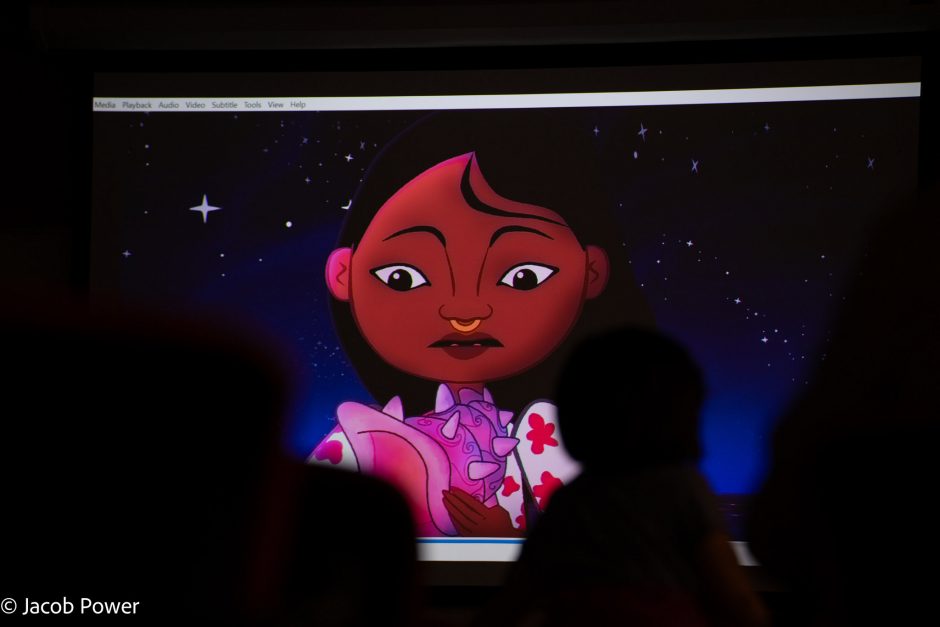
Audiences enjoy one of Folil Trafün’s Pichikeche (Children’s) Screenings of the short film “Muu Palaa.” Photo Credit: Jacob Power. What strengths did each party bring to the project?
The Vancouver Latin American Cultural Centre (VLACC) provided invaluable resources such as volunteers and connections, and expertise especially with youth and BIPOC Latinx residing in Vancouver.
The UBC Faculty of Forestry contributed logistics, hosting, community connections to the academic community, especially BIPOC, and also provided communications support to the project.During the project, what opportunities did participants have to teach, learn, or do research?
The goal of this project was to expand our understanding of teaching and learning and think critically about who possesses knowledge and is considered a teacher versus who is considered a learner. The project aimed to acknowledge the power of different knowledge systems and dismantle the hierarchy and power dynamics present in academia. Although the project was not designed to provide research opportunities, it had a transformative impact on several researchers who attended the events. Participants and organizers had opportunities to learn and teach during the panel discussions and Q&A sessions.
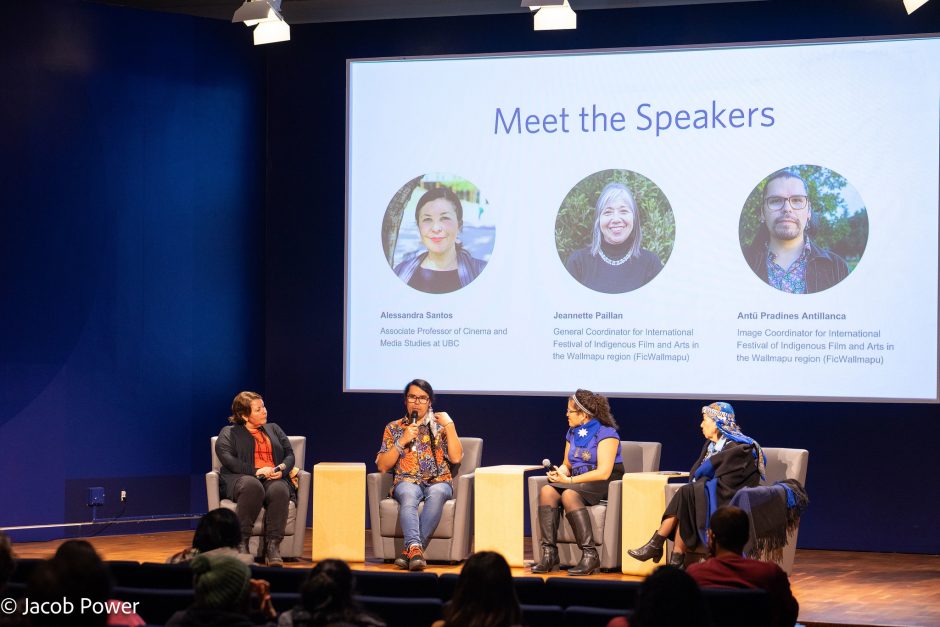
Speakers during the main showcase of the festival hosted at UBC Robson Square. Photo Credit: Jacob Power. What was your favourite outcome or experience from the project?
Our favourite outcome from the project was that we were able to pilot an unprecedented mode of collaboration and co-development guided by four pillars:
Reciprocity, Territorial dialogues, Land back, and the Positioning of Indigenous Codes.
Moreover, we want to highlight the added value that some people brought to our project. Emilia Rojas, a multidisciplinary Andean artist and Early Childhood Educator, facilitated children’s activities in the Robson Showcase, including films and the presentation of her book ‘The Adventures of Nubit.’ Additionally, we were supported when reflecting on the Folil Trafün relations and insights on a knowledge wall (live graphic recording, see below) by Adriana Contreras, a gifted Colombian artist. Adriana’s graphics fostered dialogue and created conditions for sense-making, connection, accessibility, imagination, and visioning. We will be sharing two graphics in this report, which can be seen here. Last but not least, we are also grateful to Jacob Power and Paulo Ramos for their exceptional work as photographers for the events on the 26th and 28th, and for capturing the essence of the events with great sensitivity and quality.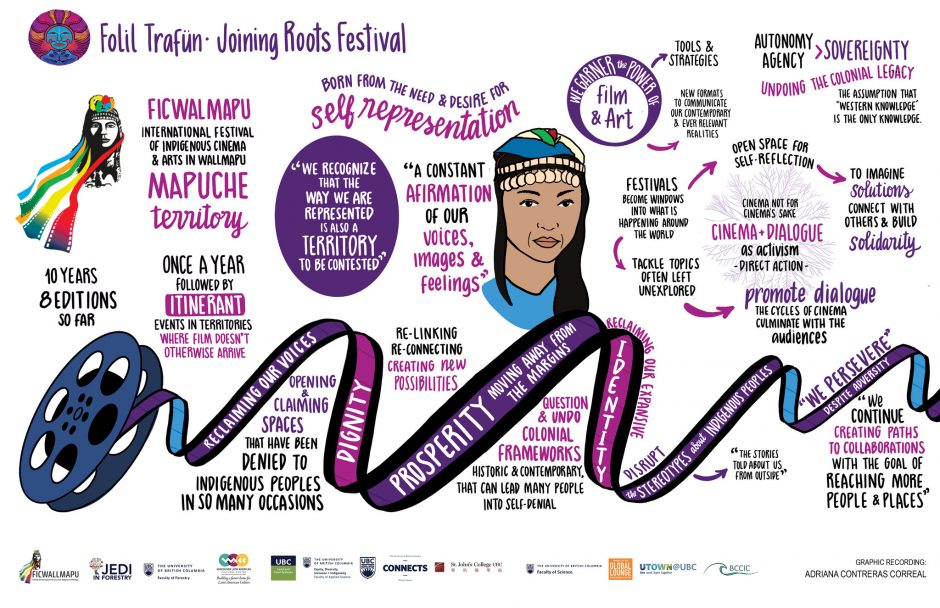
Knowledge wall (live graphic recording) by Adriana Contreras. Can you share a few lessons you learned during your project?
Early on, we learned that our partnership required us to adapt our timeline and that it would require more conversations, space and time to build trust and reciprocity. Right from the start, we committed to being transparent about our own approaches and ideas and have engaged in bilingual dialogue to address complex questions around our priorities, motivations and the agreed-upon need to have this project be a true collaboration and co-creation opportunity.
Additionally, establishing this partnership and writing this grant prompted us to discuss complex topics as well as to reflect on our own biases and preconceptions.
- Lessons from a Partnership: How United Way BC, UBC’s School of Public Policy, and the Office of Community Engagement Collaborated on a Public Policy Event
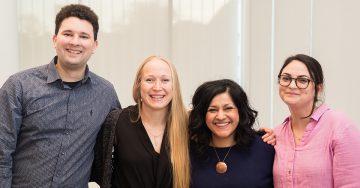
Written by Oliver Mann, Kat Cureton, Esther Moreno, and Rebecca Monnerat.
On October 27, United Way British Columbia, UBC’s School of Public Policy and Global Affairs, and UBC’s Office of Community Engagement co-hosted a full day event at UBC Robson Square called The Age of Disruption in Public Policy: DRIPA and Social Media.
The event, which sold out, was a unique meeting point for alumni from United Way BC’s Public Policy Institute, non-profit leaders, political science students, and the public. The agenda focused on the latest trends in public policy, with a particular emphasis on the Declaration on the Rights of Indigenous Peoples Act (DRIPA) and the role of social media in shaping public discourse.
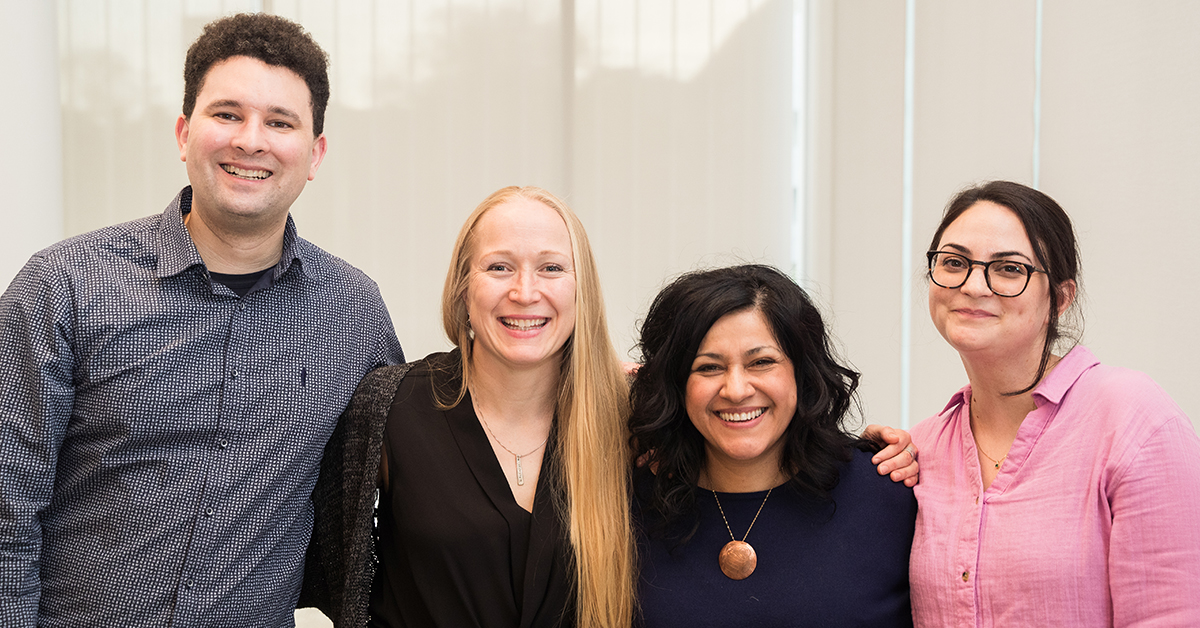
Organizing team (from left to right): Oliver Mann, Kat Cureton, Esther Moreno, and Rebecca Monnerat. About the partnership
For over a decade, UBC Robson Square has been a venue sponsor for the United Way BC Public Policy Institute (PPI), which brings together leaders from the BC non-profit sector whose organizations want to better understand and influence the public policy process.
This long-standing relationship has opened doors for the Office of Community Engagement and School of Public Policy and Global Affairs to engage with PPI programming and cohorts, but until 2023, we were unable to get any ideas for more meaningful collaborations off the ground. However, it all changed with an in-person coffee meeting in January 2023 between Esther Moreno from United Way BC, and Katie McCallum and Kat Cureton from the UBC Office of Community Engagement where we spoke about wanting to transform our relationship from a transactional sponsorship to a reciprocal partnership.
By the end of our coffees, we had crafted a shared vision and agreed excitedly to collaborate on an educational public event on pressing policy issues. UBC’s School of Public Policy and Global Affairs was an obvious partner, having collaborated on past initiatives and because of subject matter expertise and an interest in collaborating with the United Way Public Policy Institute to influence just policy making in British Columbia.
As the organizing team — Esther, Kat, Rebecca Monnerat from UBC’s School of Public Policy and Global Affairs, and Oliver Mann from UBC Community Engagement — we felt it was important to share our experiences and insights from this journey.
Lessons from hosting the Age of Disruption
Co-planning this event was an opportunity to transform the relationship between UBC and United Way BC into something more substantial. Instead of viewing UBC merely as a venue or sponsor, we envisioned a partnership rooted in mutual respect, shared goals, and a commitment to creating long-term impact, particularly within the not-for-profit sector.
In this blog post, we aim to distill the principles of what made our partnership effective. Our reflections focus on elements such as leveraging our unique strengths, adopting a shared leadership model, and maintaining open lines of communication.
The content below represents a condensed version of our post-event debrief. We used Chat GPT to refine the transcript and highlight key insights, which we hope will be beneficial for others planning to host events in partnership with different institutions.
Insight #1: Meet in-person and harness the power of online tools
Our first team planning meeting was in-person, six months before the event, at a conveniently located coffee shop which offered a neutral and relaxed setting off-campus. This environment was ideal for fostering connections, open discussions and creative brainstorming and we continued to meet at that coffee shop monthly leading up to the event.
In our debrief, Kat emphasized the critical importance of these in-person meetings. These gatherings were not just about ticking off tasks; they were key to laying the foundation of trust and mutual understanding within our team.
At the same time, utilizing online collaborative tools was essential for maintaining clarity, ensuring everyone was aligned, and integrated all aspects of our event, from marketing to execution, right from the start.
Becca pointed out the significance of having a comprehensive planning document accessible on Google Drive from the outset. This document was fundamental in tracking our shared vision and the myriad of components involved in the planning process. This foresight also aided in efficiently engaging speakers and participants, as all details were clearly outlined early on.
For the day-of we created a detailed ‘run of show’ spreadsheet which was our central reference point for the entire team, including volunteers. Download a blank template of our ‘run of show’ tool here. This tool was crucial in defining clear roles and tasks to make sure our full-day event, with concurrent sessions in different rooms, ran smoothly. We texted one another to communicate changes to the schedule. Creating a group chat or WhatsApp group might have been a better idea for day-of communications.
Insight #2: Work with people that are committed to creating a welcoming place to learn
One of the most impactful aspects of our collaboration was our dedication to building trust and creating a safe space for learning, especially in the context of reconciliation. Esther highlighted that our team discussions were not just about logistical planning but also served as a platform for professional development. The team tackled complex issues, expressed discomfort and uncertainty, and worked together to find answers, embodying the very conversations that settlers like us need to engage in regarding reconciliation. Becca echoed this sentiment, appreciating the circular and inclusive environment which was different from the often top-down approach used in large organizations.
We had open discussions about our roles and responsibilities as settlers who were organizing an event focused on DRIPA featuring Indigenous speakers. While it was important to center Indigenous voices as the experts, we felt it was our responsibility to do the heavy lifting and organizing. Guided by the principle of “nothing about us without us”, Esther, who held relationships with all our speakers, checked in very early on to learn about their goals and interests in the event. She asked them what they wanted to address and how they wanted their breakout room discussions to be designed. She asked them how they wanted the room set up, what materials they needed, etc. We did our best to reduce the burden on our speakers and set them up for a positive experience.
Since our event was free, we decided to encourage participants to make a meaningful donation that embodied the spirit of reconciliation. Based on Esther’s recommendation and relationship, we chose Indigenous Youth Roots as the recipient of our donation. This decision aligned closely with our event’s focus, as the program equips Indigenous youth with essential tools for advocating their priorities and ensures their perspectives are integrated into relevant policies. We quickly recognized we could hardly ask others to donate if our large, well-resourced organizations were not donating. We approached leadership from both institutions and were pleased to secure a $450 donation from each one so that we could more authentically ask others to join us in supporting Indigenous Youth Roots. In our reflection, one thing we might have done differently is invited Indigenous Youth Roots to be part of our programming in some way.
Oliver and Kat noted that the welcoming environment we developed in our planning seemed to have extended to the event itself, allowing for participants to engage in open, challenging conversations about reconciliation, contributing to a deeper understanding and learning for all.
Insight #3: Leverage the strengths of your organization and collaborators
Understanding and leveraging our unique skills and resources led to a more dynamic, impactful, and successful outcome. Since we were all coming from different units or institutions, it was crucial to embrace and accommodate each other’s strengths and limitations. Kat pointed out the value of honesty in recognizing our individual and collective skills — understanding not only what we can offer but also what we might need from others.
For instance, Oliver brought his expertise in communications, Esther is amazing at building relationships and was pivotal in assembling an impressive panel of experts, Becca was able to leverage the School of Public and Global Affairs’ policy expertise and her own events management experience, and Kat’s approach to reciprocal partnerships was crucial in helping us work together.
Kat highlighted the contrasting operational speeds of universities and nonprofits, noting the agility often exhibited by the latter. A typical challenge in such partnerships is the pace of processes like fund transfers, which can be considerably slower for UBC. Thankfully, Esther managed honoraria payments for speakers via United Way BC. For example, Esther was able to get the necessary cash for the Elder who provided a welcome. Paying an Elder cash on the day of is important protocol for many Indigenous communities and messing that up can be harmful to relationships, as many of us at UBC have learned the hard way.
Esther reflected on how we navigated and reconciled different compensation standards between United Way BC and UBC, culminating in a joint decision-making approach within our team. The UBC Indigenous Financial Guidelines were a helpful resource for us.
Oliver discussed the differing approaches to communication processes as well. At United Way BC, rapid initiation of event promotion was feasible, whereas UBC required a more layered process and coordination across various departments. Despite these challenges, we successfully implemented a tiered promotional approach, initially focusing on specific target groups through direct promotion by United Way BC and the School of Public Policy and Global Affairs, before extending to wider UBC channels.
Insight #4: Lead together
We quickly learned that leadership in event planning did not have to be hierarchical. When each member of the team led in their area of strength and trusted others to do the same, it created a more efficient, cohesive, and enjoyable working environment.
Thanks to those early, in-person meetings with open and honest conversations, we had co-created our goals and knew what we were each bringing to the table. In other words, we were all invested in the event planning process and the outcomes. Esther remarked on how seamless and exciting it was to work in a space where there was not just one person leading, but rather a collective leadership approach. She appreciated that there wasn’t a need to spend time convincing others to share a vision; there was a common, shared vision from the start.
On the day of the event, Esther felt confident in the team, knowing that each member of the team had their responsibilities under control, whether it was Oliver handling the A/V, Becca overseeing registration, or Kat managing the presentation. And again, that run-of-show spreadsheet really helped!
Insight #5: Embrace open communication, accountability, and apologize when necessary
It may be clear by now that this partnership was fruitful largely because we were able to bring the ‘right’ partners together who were on the same page, had shared values and a commitment to “creating a welcoming place to learn.” But it wasn’t all roses…
While planning our event, we encountered situations that required tough conversations, accountability, and at times, apologies. Fortunate for us, rather than taking us off course, these tense moments turned out to be crucial in strengthening our collaboration and trust.
Kat reflected on the ability of the team to engage in honest dialogue, even when it meant challenging each other’s ideas. Such openness was crucial when we had to significantly alter our event plans due to an overlooked grant stipulation from the UBC Connects at Robson Square program — one of our main funders. This requirement stated that the event had to be open to the public, a detail we initially missed, leading to a necessary pivot from our original focus on policy students, alumni, and nonprofit leaders.
For Esther, a defining moment was when Kat, Katie and the UBC Connects program offered a personal apology for the oversight. This gesture of acknowledging the error and seeking to amend it did more than just resolve the issue; it significantly deepened the mutual respect and trust within our team.
And in the end, the changes, though significant, were approached with a collaborative mindset, and led to a richer event experience thanks to the inclusion of public attendees.
Our journey in organizing ‘The Age of Disruption in Public Policy: DRIPA and Social Media’ has been a powerful lesson in collaboration. This experience has shown us that when you get the keen partners together and develop a shared vision, the resulting impact can be both far-reaching and profound. We are eagerly looking forward to our next opportunity to collaborate.
Think you might want to partner with UBC on your next event? Connect with us at the Community Partner Help Desk – your gateway to finding the UBC collaborators for your project.
- UBC Strategic Plan: UBC Connects at Robson Square
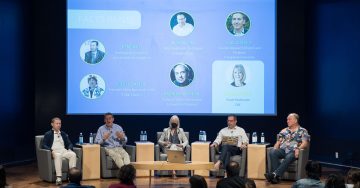
Click here to find more news and stories
Explore Upcoming and Past Events
- All the Lonely People: The Search for Belonging in an Uncertain World
 June 4, 2025 | What does loneliness look like in our increasingly connected world and what can we do about it? Join an interdisciplinary panel of UBC researchers from health, economics, philosophy and creative writing to explore the roots and realities of social isolation and how this critical social challenge can be addressed collectively within the broader contexts of men’s and women’s health, relationships, climate preparedness and governance.
June 4, 2025 | What does loneliness look like in our increasingly connected world and what can we do about it? Join an interdisciplinary panel of UBC researchers from health, economics, philosophy and creative writing to explore the roots and realities of social isolation and how this critical social challenge can be addressed collectively within the broader contexts of men’s and women’s health, relationships, climate preparedness and governance. - Reframing ADHD: Moving Beyond Stigma to Advocate for a More Inclusive Future
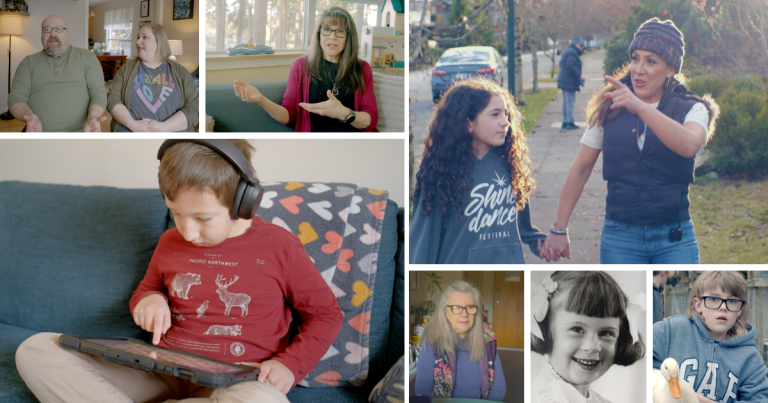 May 2, 2025 | Join us for a conversation with Dr. Amori Yen Mikami and the ADHD Advocacy Society of BC as we explore ADHD research, challenge stigma, and premiere a new video series promoting acceptance and inclusion.
May 2, 2025 | Join us for a conversation with Dr. Amori Yen Mikami and the ADHD Advocacy Society of BC as we explore ADHD research, challenge stigma, and premiere a new video series promoting acceptance and inclusion. - Remembering Tadmor: Exploring the Use of Digital Conservation After Destruction
 May 10, 2025 | Can we build a digital defense against the erasure of culture? Join UBC Connects at Robson Square and the Department of Anthropology for a fascinating conversation about how digital technologies, communities, and diplomacy can come together to preserve cultural memory.
May 10, 2025 | Can we build a digital defense against the erasure of culture? Join UBC Connects at Robson Square and the Department of Anthropology for a fascinating conversation about how digital technologies, communities, and diplomacy can come together to preserve cultural memory.
Click here for a full list of all current and past events and collaborators
Photo Gallery
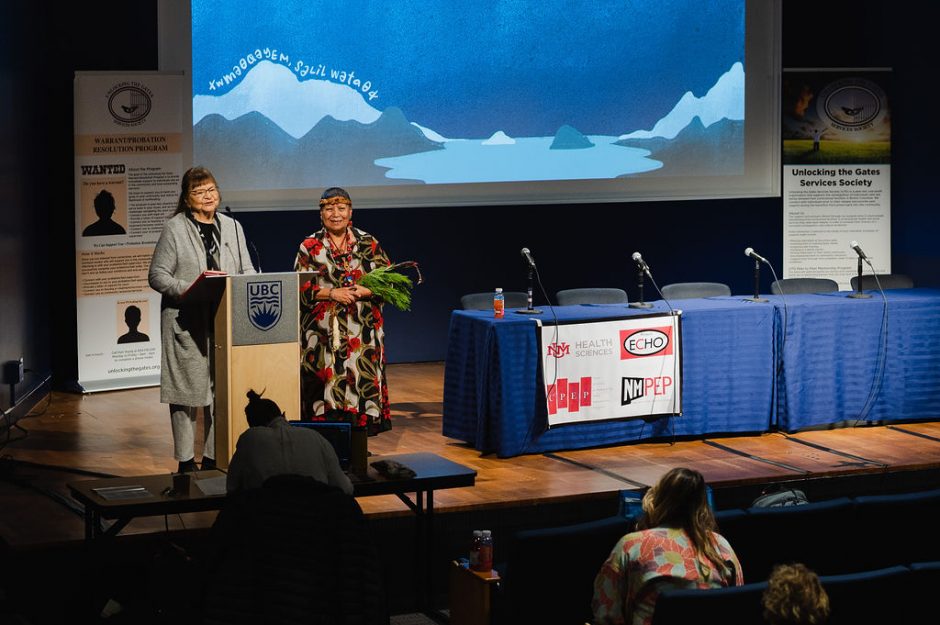
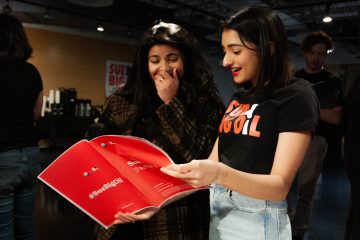
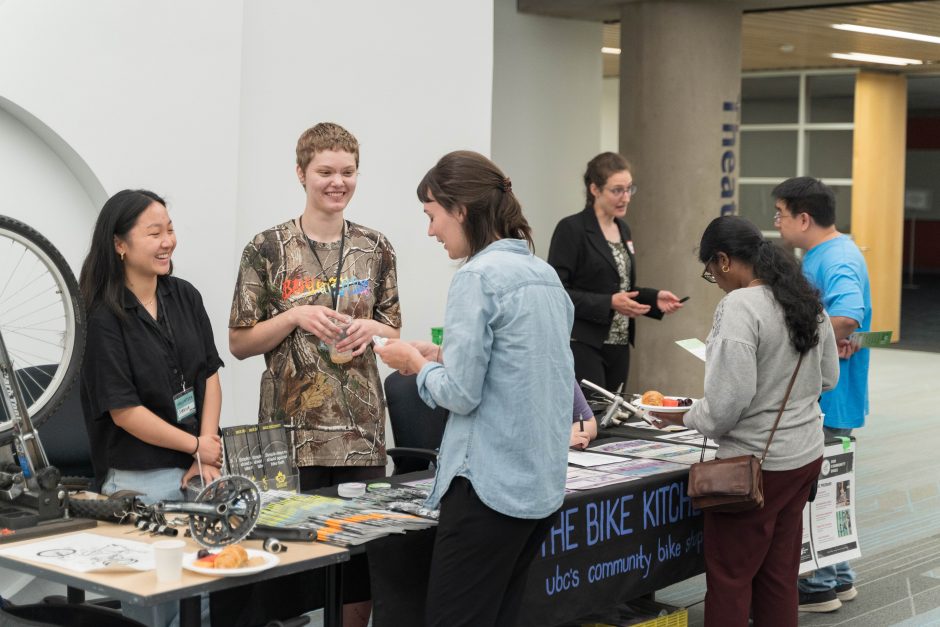
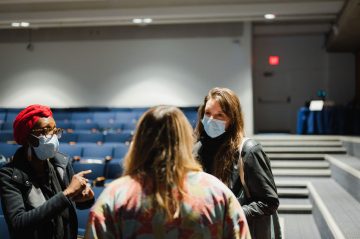
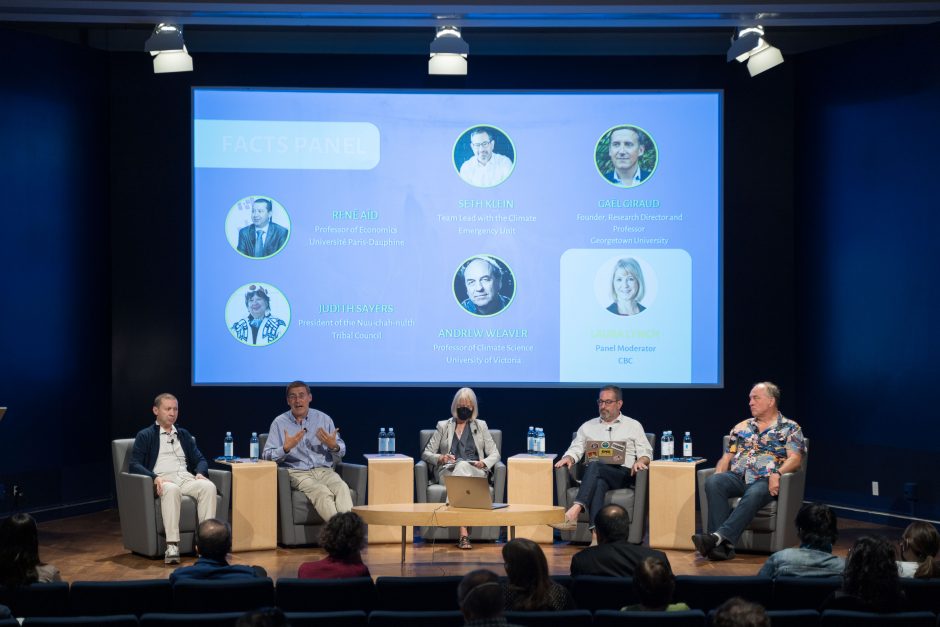
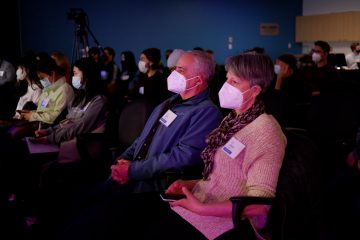
Click here to view the photo gallery of past events
Program Objectives
1. Supporting faculty and community partners in public engagement
Providing innovative, reciprocal programming to the UBC community and general public
2. Alignment with Presidential Priorities
Minimum of 50% of events addressing strategic priorities
3. 1-2 events per month
For a total of 25 events annually
Program Testimonial
“UBC Connects at Robson Square played a crucial role in bringing the Cinema Thinks The World series of film screenings to life at UBC. Being located downtown, UBC Connects managed to bring a series of six films, as well as the scholarly discussions that surrounded them, to a wider Vancouver public.”
— Dr. William Brown, Assistant Professor, Department of Theatre and Film
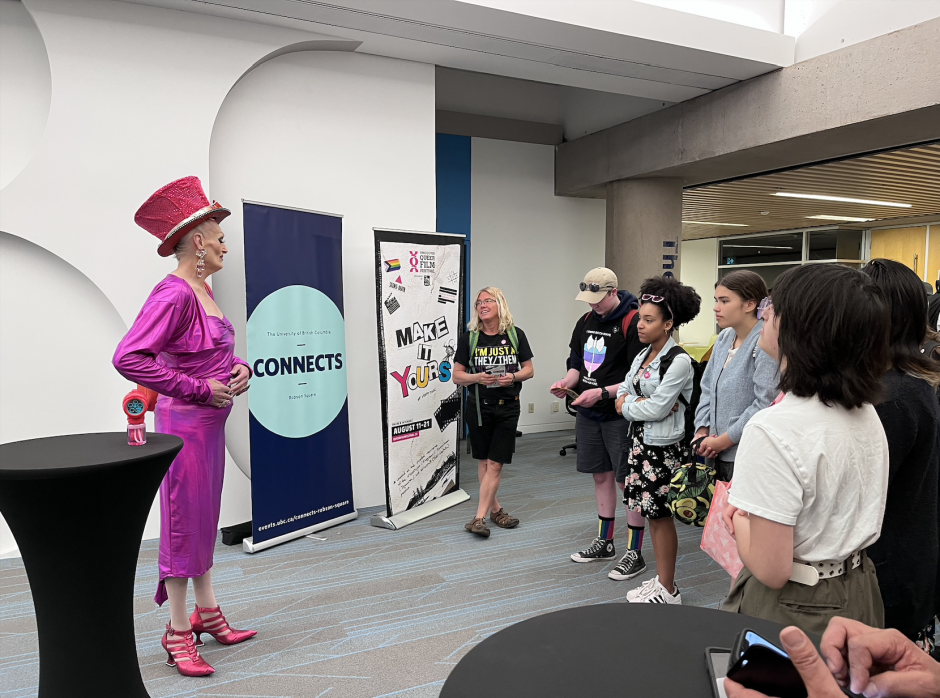
Program Development
Timeline
2022
January: Secured staff support for programming
March: First advisory board meeting was held to determine program themes and application processes
April: With support from UBC Brand and Marketing program website and newsletter was launched with unique digital assets
May: Soft launch of program began, hosting events from select UBC faculty and community organizations
August: Applications opened to UBC faculty, staff, students and community organizations
October: First Connects at Robson Square event approved for funding from the formal application process
December: Program criteria and applications review process was adapted to increase accessibility to funding in preparation for full launch of program in January 2023
2023
January – Present: Regular monthly programming at Robson Square
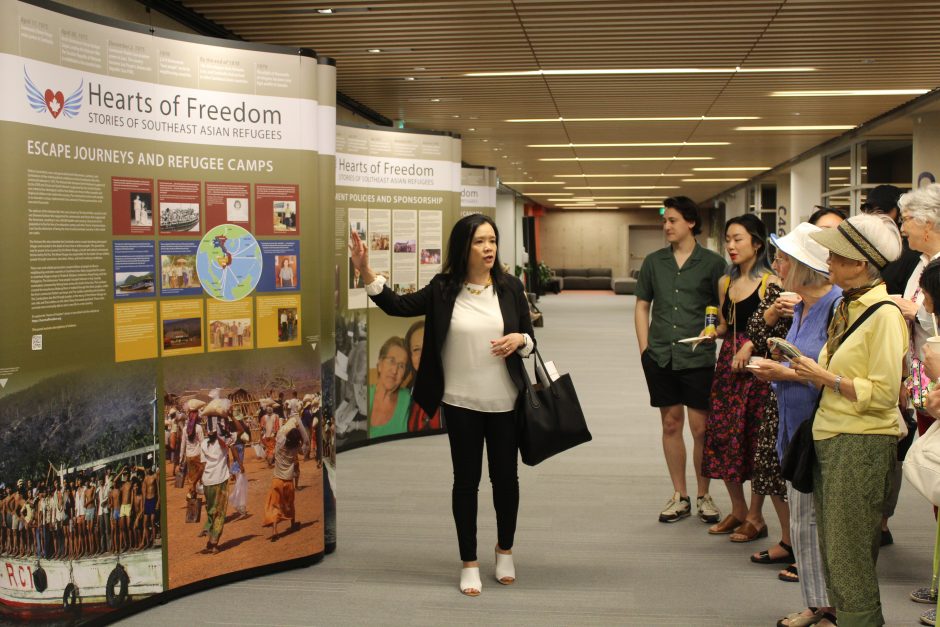
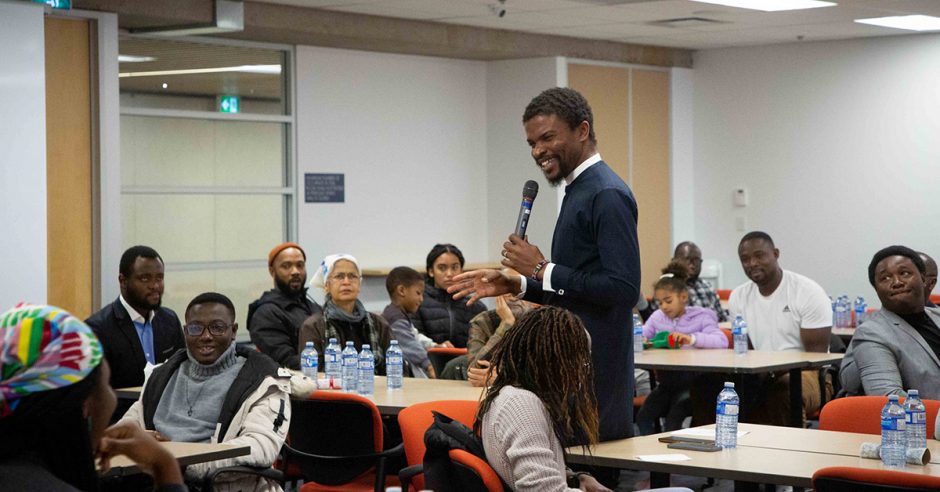
Program Evolution
Connects at Robson Square has been responsive and adaptive to the feedback from applicants, funding recipients, and attendees throughout its pilot. An overview of some of the changes that have been made are below.
Before
- Application funding cycles mirror UBC academic terms
- Fundings recipients receive $5,000 for each event
- UBC faculty, staff and students require a community partner to apply
After
- Rolling applications to allow for responsive event
- Funding recipients receive $5,000 in addition to venue and A/V costs
- Community partner requirement has been removed to increase funding accessibility
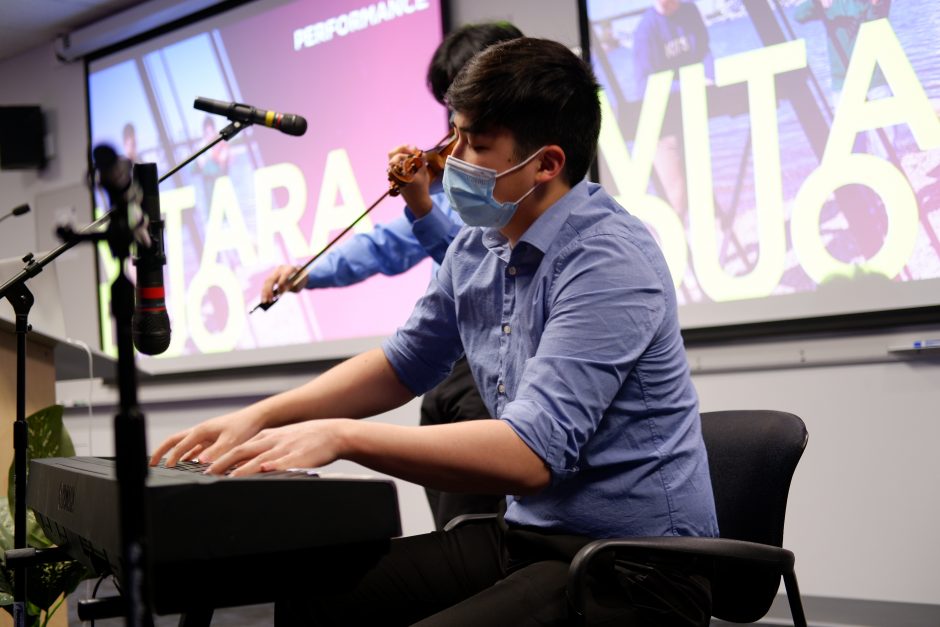
Program Testimonials from funding recipients
“We often hear that audience members from downtown feel UBC is too far out for them to travel to attend concerts. By demonstrating the quality and range of music making that takes place on campus, we begin to develop recognition for the work that we do and encourage new audiences to come out to campus to attend events. […] We feel that this is an impactful outreach that should be continued. Moreover, we have many ideas for future collaborations.”
— Dr. T. Patrick Carrabre, Director and Professor of Music, UBC School of Music
Events at a Glance
Types of Events
- Pop-up concert
- Workshop
- Film Screening
- Panel discussion
- Artist talk
- Exhibition
25 events hosted total
The program’s soft launch hosted 10 events while 15 have come from funding recipients, meeting our current goal of 1-2 events monthly.
20-200 attendees
per event
From small pop-up concerts and workshops to larger events like exhibitions, panel discussions, and film screenings.
Program Experience
96%
of attendees learned something new, gains new insight or new perspective on issue after event.
86%
indicated likelihood to seek out follow-up activities, such as joining an organization around an event topic or connecting with the speakers at an event.
92%
indicated likelihood to return to UBC Robson Square for future events.
Program Testimonial from funding recipients
“UBC Connects provided the Transformative Health and Justice Research Cluster (THJRC) an opportunity to host a community event that brought together voices from intersecting departments, organizations and universities. THJRC values this opportunity, as many community organizations do not have the funding to put on these events, but would like the ability to reach a wider audience and connect more with the community of Vancouver and beyond.”
— Samantha Young, Project Coordinator of UBC’s Transformative Health and Justice Research Cluster (THJRC)
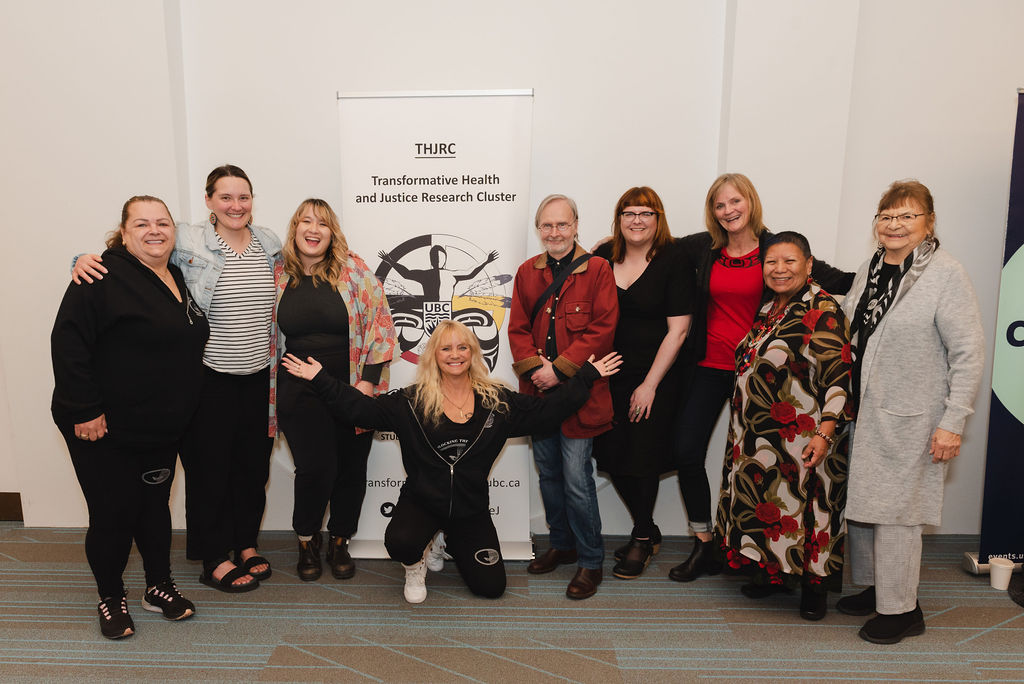
Program Applications
3 out of 5
applications are approved.
To increase accessibility to funding, applications that do not currently merit funding are sent back to applicant with suggestions for improvement.
Faculty Engagement
60% of the funds for events was delivered to faculties for programming, in addition to the support of a dedicated Public Engagement Specialist to assist staff/faculty organizers with planning, program delivery, communications, and on-site support.
UBC departments and units engaged in past and future event programming include:
- Faculty of Applied Science
- School of Nursing –Transformative Health and Justice Research Cluster (THJRC)
- Faculty of Education
- Research-based Theatre Lab
- SOGI UBC (Sexual Orientation and Gender Identity Inclusive Education)
- Faculty of Arts
- Centre for Asian Canadian Research and Engagement (ACRE)
- Department of Theatre & Film
- Hong Kong Studies Initiative
- School of Music
- Faculty of Land and Food Systems
- Faculty of Forestry
- Climate Hub
- Public Humanities Hub
- Irving K. Barber Learning Centre
- Pacific Institute for Mathematical Sciences (PIMS)
- Liu Institute Network for Africa
Strategic Alignment with ’21-22 Presidential Priorities
95% of Connects events have been related to UBC’s Presidential Priority areas, exceeding our goals of having a minimum of 12 events addressing these topics
65%
Anti-racism and Equity, Diversity and Inclusion
35%
Climate Change, Climate Justice, and Sustainability
15%
Indigenous Engagement and Reconciliation
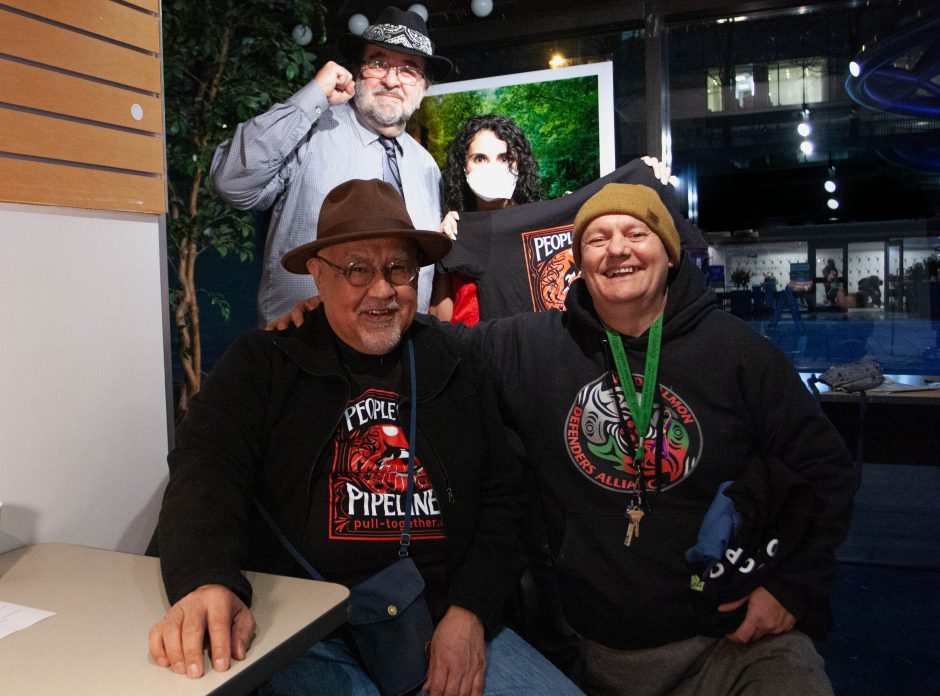
Program Testimonial
“There is a growing interest to bridge research and student learning with community connections in a reciprocal exchange.”
— Christine Lee, Associate Director of Arts Alumni Engagement
Thank you!
Have questions about the report or the Connects at Robson Square program? Please connect with us at connects.robsonsquare@ubc.ca